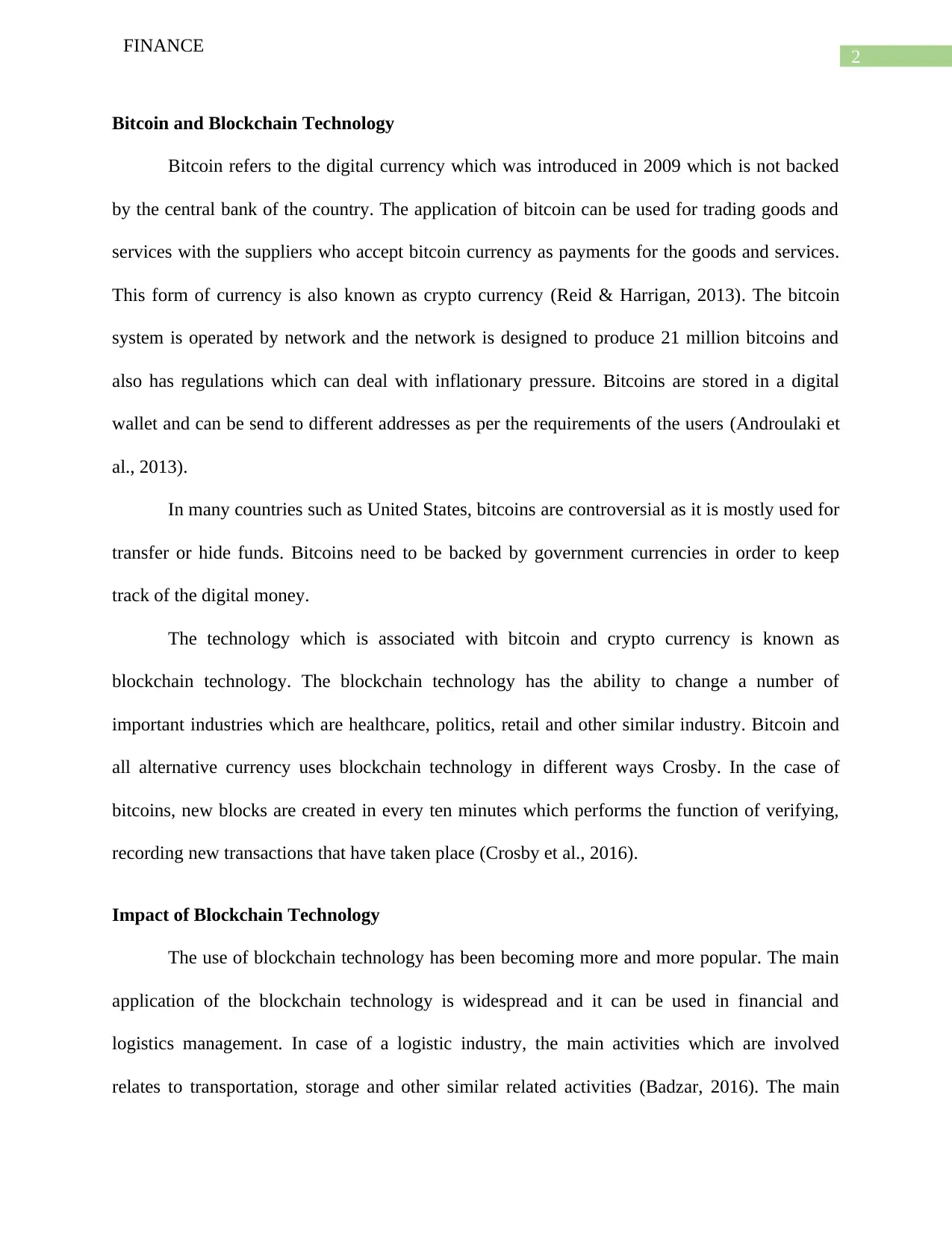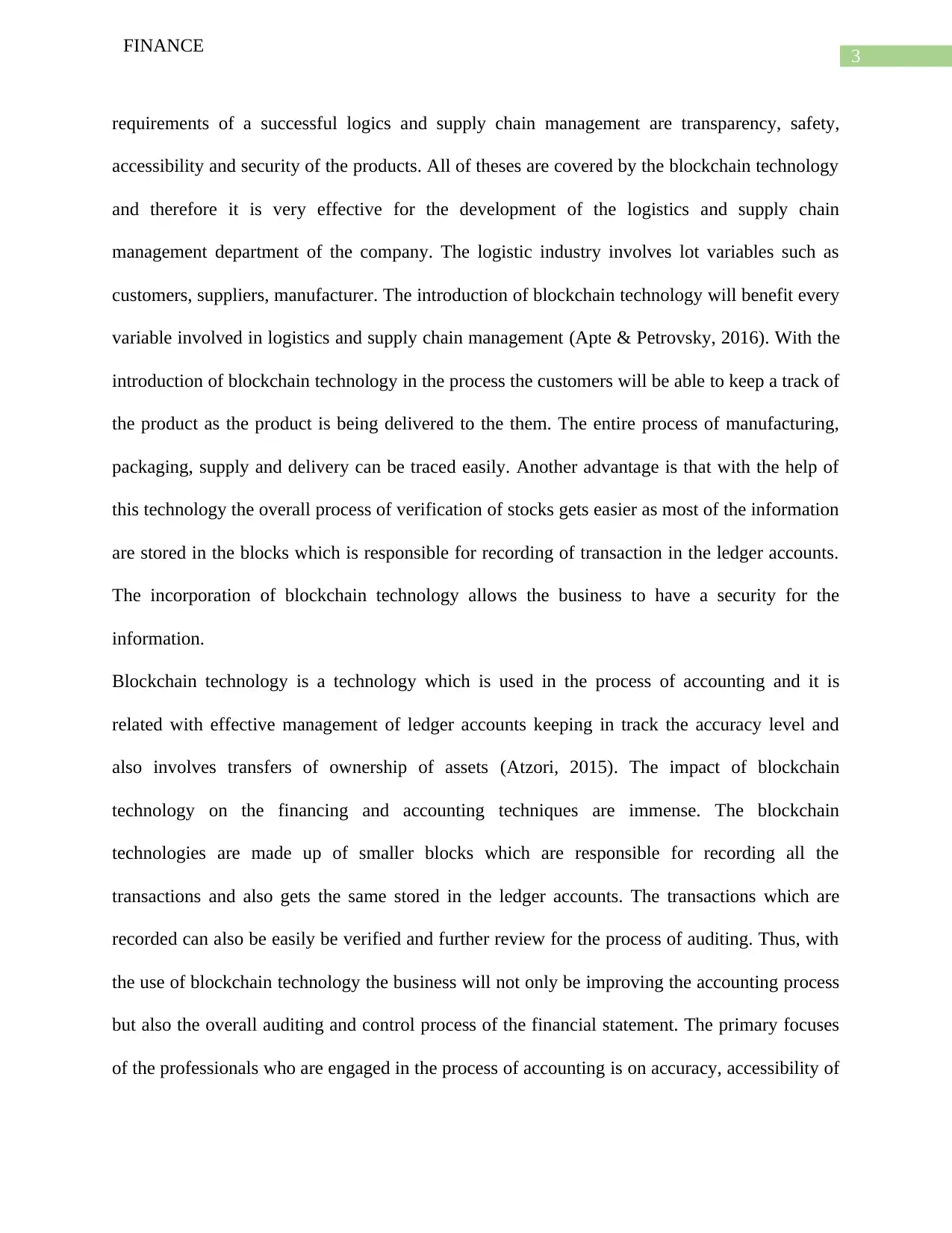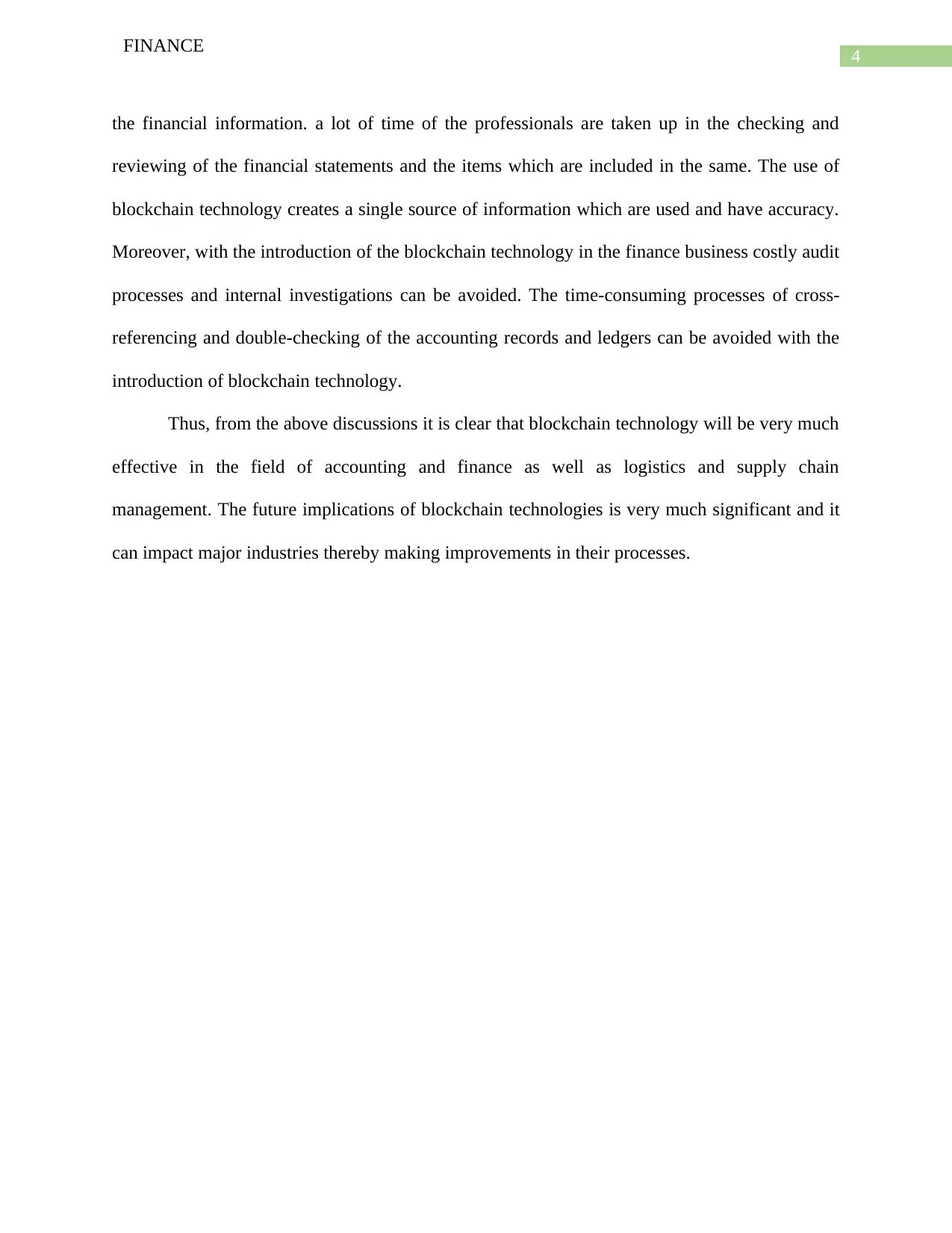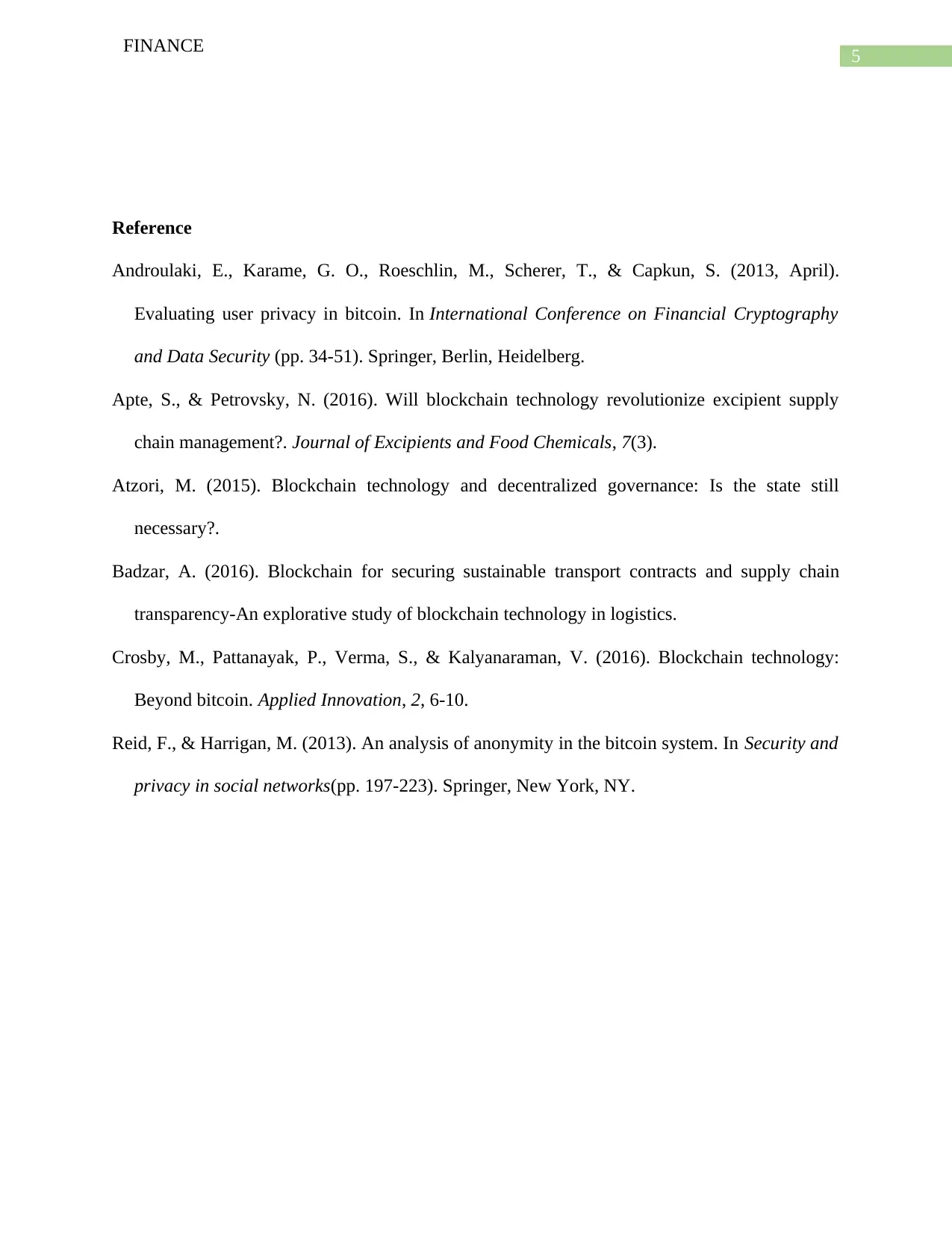Impact of Blockchain Technology on Finance and Logistics Management
VerifiedAdded on 2023/06/15
|6
|1086
|222
AI Summary
This article discusses the impact of blockchain technology on finance and logistics management. It explores how blockchain technology can improve accounting, auditing, and supply chain management processes. The article also explains how blockchain technology works and its applications in different industries.
Contribute Materials
Your contribution can guide someone’s learning journey. Share your
documents today.

Running head: FINANCE
FINANCE
Name of the Student:
Name of the University:
Author’s Note:
FINANCE
Name of the Student:
Name of the University:
Author’s Note:
Secure Best Marks with AI Grader
Need help grading? Try our AI Grader for instant feedback on your assignments.

1
FINANCE
Table of Contents
Bitcoin and Blockchain Technology...............................................................................................2
Impact of Blockchain Technology...................................................................................................2
Reference.........................................................................................................................................5
FINANCE
Table of Contents
Bitcoin and Blockchain Technology...............................................................................................2
Impact of Blockchain Technology...................................................................................................2
Reference.........................................................................................................................................5

2
FINANCE
Bitcoin and Blockchain Technology
Bitcoin refers to the digital currency which was introduced in 2009 which is not backed
by the central bank of the country. The application of bitcoin can be used for trading goods and
services with the suppliers who accept bitcoin currency as payments for the goods and services.
This form of currency is also known as crypto currency (Reid & Harrigan, 2013). The bitcoin
system is operated by network and the network is designed to produce 21 million bitcoins and
also has regulations which can deal with inflationary pressure. Bitcoins are stored in a digital
wallet and can be send to different addresses as per the requirements of the users (Androulaki et
al., 2013).
In many countries such as United States, bitcoins are controversial as it is mostly used for
transfer or hide funds. Bitcoins need to be backed by government currencies in order to keep
track of the digital money.
The technology which is associated with bitcoin and crypto currency is known as
blockchain technology. The blockchain technology has the ability to change a number of
important industries which are healthcare, politics, retail and other similar industry. Bitcoin and
all alternative currency uses blockchain technology in different ways Crosby. In the case of
bitcoins, new blocks are created in every ten minutes which performs the function of verifying,
recording new transactions that have taken place (Crosby et al., 2016).
Impact of Blockchain Technology
The use of blockchain technology has been becoming more and more popular. The main
application of the blockchain technology is widespread and it can be used in financial and
logistics management. In case of a logistic industry, the main activities which are involved
relates to transportation, storage and other similar related activities (Badzar, 2016). The main
FINANCE
Bitcoin and Blockchain Technology
Bitcoin refers to the digital currency which was introduced in 2009 which is not backed
by the central bank of the country. The application of bitcoin can be used for trading goods and
services with the suppliers who accept bitcoin currency as payments for the goods and services.
This form of currency is also known as crypto currency (Reid & Harrigan, 2013). The bitcoin
system is operated by network and the network is designed to produce 21 million bitcoins and
also has regulations which can deal with inflationary pressure. Bitcoins are stored in a digital
wallet and can be send to different addresses as per the requirements of the users (Androulaki et
al., 2013).
In many countries such as United States, bitcoins are controversial as it is mostly used for
transfer or hide funds. Bitcoins need to be backed by government currencies in order to keep
track of the digital money.
The technology which is associated with bitcoin and crypto currency is known as
blockchain technology. The blockchain technology has the ability to change a number of
important industries which are healthcare, politics, retail and other similar industry. Bitcoin and
all alternative currency uses blockchain technology in different ways Crosby. In the case of
bitcoins, new blocks are created in every ten minutes which performs the function of verifying,
recording new transactions that have taken place (Crosby et al., 2016).
Impact of Blockchain Technology
The use of blockchain technology has been becoming more and more popular. The main
application of the blockchain technology is widespread and it can be used in financial and
logistics management. In case of a logistic industry, the main activities which are involved
relates to transportation, storage and other similar related activities (Badzar, 2016). The main

3
FINANCE
requirements of a successful logics and supply chain management are transparency, safety,
accessibility and security of the products. All of theses are covered by the blockchain technology
and therefore it is very effective for the development of the logistics and supply chain
management department of the company. The logistic industry involves lot variables such as
customers, suppliers, manufacturer. The introduction of blockchain technology will benefit every
variable involved in logistics and supply chain management (Apte & Petrovsky, 2016). With the
introduction of blockchain technology in the process the customers will be able to keep a track of
the product as the product is being delivered to the them. The entire process of manufacturing,
packaging, supply and delivery can be traced easily. Another advantage is that with the help of
this technology the overall process of verification of stocks gets easier as most of the information
are stored in the blocks which is responsible for recording of transaction in the ledger accounts.
The incorporation of blockchain technology allows the business to have a security for the
information.
Blockchain technology is a technology which is used in the process of accounting and it is
related with effective management of ledger accounts keeping in track the accuracy level and
also involves transfers of ownership of assets (Atzori, 2015). The impact of blockchain
technology on the financing and accounting techniques are immense. The blockchain
technologies are made up of smaller blocks which are responsible for recording all the
transactions and also gets the same stored in the ledger accounts. The transactions which are
recorded can also be easily be verified and further review for the process of auditing. Thus, with
the use of blockchain technology the business will not only be improving the accounting process
but also the overall auditing and control process of the financial statement. The primary focuses
of the professionals who are engaged in the process of accounting is on accuracy, accessibility of
FINANCE
requirements of a successful logics and supply chain management are transparency, safety,
accessibility and security of the products. All of theses are covered by the blockchain technology
and therefore it is very effective for the development of the logistics and supply chain
management department of the company. The logistic industry involves lot variables such as
customers, suppliers, manufacturer. The introduction of blockchain technology will benefit every
variable involved in logistics and supply chain management (Apte & Petrovsky, 2016). With the
introduction of blockchain technology in the process the customers will be able to keep a track of
the product as the product is being delivered to the them. The entire process of manufacturing,
packaging, supply and delivery can be traced easily. Another advantage is that with the help of
this technology the overall process of verification of stocks gets easier as most of the information
are stored in the blocks which is responsible for recording of transaction in the ledger accounts.
The incorporation of blockchain technology allows the business to have a security for the
information.
Blockchain technology is a technology which is used in the process of accounting and it is
related with effective management of ledger accounts keeping in track the accuracy level and
also involves transfers of ownership of assets (Atzori, 2015). The impact of blockchain
technology on the financing and accounting techniques are immense. The blockchain
technologies are made up of smaller blocks which are responsible for recording all the
transactions and also gets the same stored in the ledger accounts. The transactions which are
recorded can also be easily be verified and further review for the process of auditing. Thus, with
the use of blockchain technology the business will not only be improving the accounting process
but also the overall auditing and control process of the financial statement. The primary focuses
of the professionals who are engaged in the process of accounting is on accuracy, accessibility of
Secure Best Marks with AI Grader
Need help grading? Try our AI Grader for instant feedback on your assignments.

4
FINANCE
the financial information. a lot of time of the professionals are taken up in the checking and
reviewing of the financial statements and the items which are included in the same. The use of
blockchain technology creates a single source of information which are used and have accuracy.
Moreover, with the introduction of the blockchain technology in the finance business costly audit
processes and internal investigations can be avoided. The time-consuming processes of cross-
referencing and double-checking of the accounting records and ledgers can be avoided with the
introduction of blockchain technology.
Thus, from the above discussions it is clear that blockchain technology will be very much
effective in the field of accounting and finance as well as logistics and supply chain
management. The future implications of blockchain technologies is very much significant and it
can impact major industries thereby making improvements in their processes.
FINANCE
the financial information. a lot of time of the professionals are taken up in the checking and
reviewing of the financial statements and the items which are included in the same. The use of
blockchain technology creates a single source of information which are used and have accuracy.
Moreover, with the introduction of the blockchain technology in the finance business costly audit
processes and internal investigations can be avoided. The time-consuming processes of cross-
referencing and double-checking of the accounting records and ledgers can be avoided with the
introduction of blockchain technology.
Thus, from the above discussions it is clear that blockchain technology will be very much
effective in the field of accounting and finance as well as logistics and supply chain
management. The future implications of blockchain technologies is very much significant and it
can impact major industries thereby making improvements in their processes.

5
FINANCE
Reference
Androulaki, E., Karame, G. O., Roeschlin, M., Scherer, T., & Capkun, S. (2013, April).
Evaluating user privacy in bitcoin. In International Conference on Financial Cryptography
and Data Security (pp. 34-51). Springer, Berlin, Heidelberg.
Apte, S., & Petrovsky, N. (2016). Will blockchain technology revolutionize excipient supply
chain management?. Journal of Excipients and Food Chemicals, 7(3).
Atzori, M. (2015). Blockchain technology and decentralized governance: Is the state still
necessary?.
Badzar, A. (2016). Blockchain for securing sustainable transport contracts and supply chain
transparency-An explorative study of blockchain technology in logistics.
Crosby, M., Pattanayak, P., Verma, S., & Kalyanaraman, V. (2016). Blockchain technology:
Beyond bitcoin. Applied Innovation, 2, 6-10.
Reid, F., & Harrigan, M. (2013). An analysis of anonymity in the bitcoin system. In Security and
privacy in social networks(pp. 197-223). Springer, New York, NY.
FINANCE
Reference
Androulaki, E., Karame, G. O., Roeschlin, M., Scherer, T., & Capkun, S. (2013, April).
Evaluating user privacy in bitcoin. In International Conference on Financial Cryptography
and Data Security (pp. 34-51). Springer, Berlin, Heidelberg.
Apte, S., & Petrovsky, N. (2016). Will blockchain technology revolutionize excipient supply
chain management?. Journal of Excipients and Food Chemicals, 7(3).
Atzori, M. (2015). Blockchain technology and decentralized governance: Is the state still
necessary?.
Badzar, A. (2016). Blockchain for securing sustainable transport contracts and supply chain
transparency-An explorative study of blockchain technology in logistics.
Crosby, M., Pattanayak, P., Verma, S., & Kalyanaraman, V. (2016). Blockchain technology:
Beyond bitcoin. Applied Innovation, 2, 6-10.
Reid, F., & Harrigan, M. (2013). An analysis of anonymity in the bitcoin system. In Security and
privacy in social networks(pp. 197-223). Springer, New York, NY.
1 out of 6
Related Documents
Your All-in-One AI-Powered Toolkit for Academic Success.
+13062052269
info@desklib.com
Available 24*7 on WhatsApp / Email
![[object Object]](/_next/static/media/star-bottom.7253800d.svg)
Unlock your academic potential
© 2024 | Zucol Services PVT LTD | All rights reserved.





